Let our expert English tutors assist your child to develop their confidence and improve their school achievements in reading, writing and spelling!
Our English tutoring lessons assist students to understand English concepts, build specific skill sets, gain confidence and become motivated readers, writers and spellers.
English Tutoring from Prep to Year 2
The first three years of school are arguably the most important for a student, particularly in English. From Prep to Year 2, students are developing their foundational knowledge and skills in the areas of phonemic and phonological awareness, reading, writing, listening, speaking and spelling. If a student falls behind in English in their early years of school, research shows that it is extremely difficult for them to catch up in later years without extra assistance.
Whilst the focus of our individualised tutoring is dependent on the specific learning needs of each student, our tutoring lessons cover the full range of early English skills taught at school, including:
- Print concepts and associated vocabulary
- Letters of the alphabet, and the sounds they make
- Blending vowels and consonants to read and write
- The use of reading strategies to decode unfamiliar text
- Reading and writing a range of frequently encountered words, also known as sight words, with automaticity
- Editing and punctuating personal writing
- Reading fluency and expression
- Constructing sentences using correct grammar
- Developing the ability to read and write a variety of text types
- Handwriting formation
- Reading comprehension, including literal and inferential comprehension skills
- Blends and digraphs
English – Foundation
The literacy understandings students develop in their first school year will form the ‘foundation’ of all their future learning. By the end of the Foundation Year students are expected to write and recognise the letters of the alphabet, including the sounds they commonly make. They are also expected to be able to read and understand short repetitive texts, and write short stories using their word and sound knowledge. Students are also expected to be able to recognise a range of sight words, and correctly sound out 3 letter CVC words.
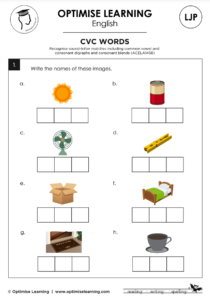
English – Year 01
In their second year of school, students are consolidating and extending the literacy understandings they gained in the Foundation Year. By the end of Year One students are expected to be able to read short stories with understanding, write short imaginative and informative texts and demonstrate an understanding of short vowels, sight words, common long vowels, consonant digraphs and consonant blends.
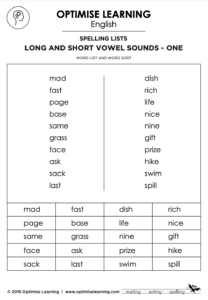
English – Year 02
Students in their third year of school are continuing to consolidate and extend their early understandings of literacy. By the end of Year Two students are expected to read and understand unfamiliar texts whilst monitoring meaning and self-correcting using their knowledge of phonics, syntax, punctuation and semantics. They are also expected to recognise common spelling patterns, and write short imaginative, information and persuasive texts.
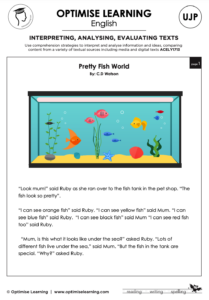
English Tutoring from Year 3 to Year 6
Throughout the middle and upper years of Primary School, students are consolidating and extending their English knowledge and skills in the areas of reading, writing, listening, speaking and spelling.
Whilst the focus of our individualised lessons is dependent on the specific learning needs of each student, our tutoring lessons cover the full range of English skills taught from Year 3 to Year 6 at school. This involves developing proficiencies in a range of areas, including:
- Complex grammar and punctuation
- Spelling patterns and rules, including syllables, affixes and derivational relations
- Strategic reading of various text types
- The ability to compare and analyse different text types, explaining both literal and implied meaning
- Planning and writing a range of text types, elaborating on key ideas for a range of purposes and using a variety of language features
- Clause and sentence structure
- Using language features and patterns for emphasis in personal writing
- The ability to select and use evidence from a text
- Use specific vocabulary choices to enhance cohesion and structure in written pieces
- Classifying word, sentence and text structures
- Using metalanguage to communicate ideas
English – Year 03
By the end of Year Three students are expected to read and comprehend a variety of text types that contain varied sentence structures and punctuation conventions. Students use their phonics and word knowledge to fluently read increasingly complex words. They demonstrate an understanding of grammar, and are able to write a variety of text types using the correct text structure and appropriate language features. The first year of NAPLAN provides insights into individual student’s progress and highlights areas that require support or extension.
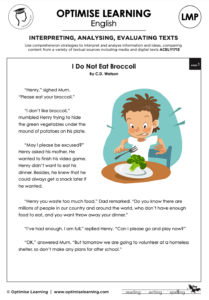
English – Year 04
By the end of Year Four students are expected to fluently read texts that include varied sentence structures, unfamiliar vocabulary and multisyllabic words, demonstrating the ability to make literal and inferential meaning. Students write a range of text types that demonstrate a thorough understanding of grammar and use accurate spelling and punctuation. They re-read and edit their written work to improve meaning.
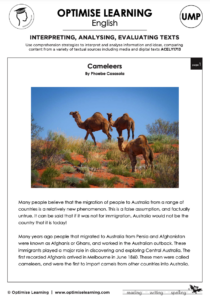
English – Year 05
By the end of Year Five students are able to read and decode unfamiliar words using their phonic, grammatical, semantic and contextual knowledge. They can explain different points of view and create imaginative, informative and persuasive texts for different purposes and audiences. When writing, students demonstrate an understanding of grammar and use a variety of sentence types. Student use accurate spelling and punctuation in their written work, and edit their writing for cohesive structure and meaning. The second year of NAPLAN provides insights into individual student’s progress and highlights areas that require support or extension.
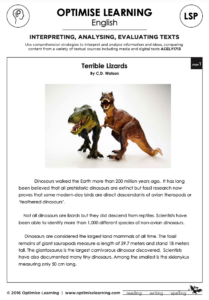
English – Year 06
By the end of their final year of primary school, students are expected to be able to compare and analyse information in different text types, while explaining the literal and implied meaning. Students create detailed texts elaborating on key ideas, and select vocabulary to enhance cohesion and structure in their writing. They use accurate spelling and punctuation, and explain their editorial choices based on criteria.
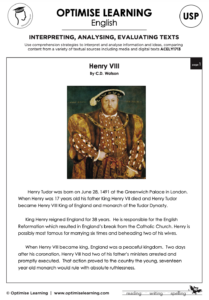
Our Reading Comprehension Tasks Can Improve Your Child’s Skills in Decoding, Literal Understandings and Inferential Understandings
READING COMPREHENSION TASKS (PREP TO YEAR 6)
Optimise Learning’s Reading Comprehension tasks provide students with a levelled text to read and a range of comprehension, vocabulary and grammar activities to complete. By completing our reading comprehension tasks students are developing their ability to read and comprehend texts in correlation with *Australian Curriculum Achievement Standards.
*Achievement Standards describe the expected knowledge, understanding and skills of students at each year level. You can read more about Australian Curriculum Achievement Standards HERE.
What Our Parents & Students Have To Say
Start Optimising Your Child’s School Achievements Today!
Our academic tutoring services have assisted hundreds of students throughout Australia to develop their self-confidence, and improve their achievements at school.
Contact us to discuss your child’s learning needs and academic goals.
